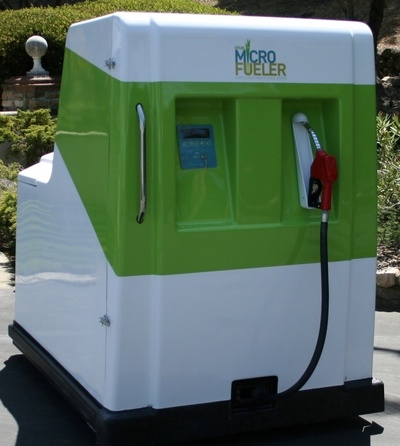
People were making ethanol at home long before there were cars. They called it moonshine. With gas prices going through the roof and everyone worried about global warming, a California company is betting people will jump at the chance to use the same technology to turn sugar into fuel for less than a buck a gallon.
E-Fuel Corporation has unveiled its EFuel 100 MicroFueler, a device about the size of a stacking washer-dryer that uses sugar, yeast and water to make 100 percent ethanol at the push of a button.
"You just open it like a washing machine and dump in your sugar, close the door and push one button," company founder Tom Quinn told us. "A few days later, you've got ethanol."
Is it really that easy?
 According to Quinn, it is. The MicroFueler weighs about 200 pounds
and hooks up to a water and 110 or 220 volt power supply and
wastewater drain just like a washing machine. It uses raw
sugar (not the refined white stuff) and
a proprietary
time-release yeast mixture as feedstock. You can also use
left-over booze if you've got any lying around.
Toss it all into the
fermenting tank, turn on the machine and in seven days you've
got 35 gallons of ethanol. The MicroFueler has its own pump and hose
- just like the pump at your corner gas station - so you can easily
fill up your car.
According to Quinn, it is. The MicroFueler weighs about 200 pounds
and hooks up to a water and 110 or 220 volt power supply and
wastewater drain just like a washing machine. It uses raw
sugar (not the refined white stuff) and
a proprietary
time-release yeast mixture as feedstock. You can also use
left-over booze if you've got any lying around.
Toss it all into the
fermenting tank, turn on the machine and in seven days you've
got 35 gallons of ethanol. The MicroFueler has its own pump and hose
- just like the pump at your corner gas station - so you can easily
fill up your car."It's so simple, anyone can make their own fuel," Quinn says. Depending upon the cost of electricity and water, he says, the MicroFueler can produce ethanol for less than $1 a gallon. Quinn likens the MicroFueler to the personal computer and says it will cause the same sort of "paradigm shift."
"Just as the PC brought desktop computing to the home, E-Fuel will bring the filling station to the home," he says.
Maybe. Maybe not. Making ethanol at home is not as easy as Quinn might have you believe, says Daniel Kammen, director of the Renewable and Appropriate Energy Laboratory at UC-Berkeley. Making a lot of ethanol has generally required a lot of equipment, he told the New York Times, and quality control can be uneven.
“There’s a lot of hurdles you have to overcome. It’s entirely possible that they’ve done it, but skepticism is a virtue,” Kammen says.
Quinn is not some moonshiner trying to make a quick buck on the alt-fuel craze. He's a longtime entrepreneur who patented the motion-control technology Nintendo uses in the Wii. His partner in the E-Fuel venture is Floyd Butterfield, who has been distilling ethanol for more than 25 years and in 1982 won a California Department of Food and Agriculture contest for best design of an ethanol still.
They say they've overcome many of the hurdles to making ethanol at home cheaply, easily and efficiently. Quinn says the biggest breakthrough is the MicroFueler's membrane distiller, which uses an extremely fine filter to separate water from alcohol at lower temperatures and in fewer steps than conventional methods. Using sugar as a feedstock makes the process virtually odorless, he says, and leaves the wastewater so clean you can drink it. It also avoids the food-for-fuel debate that plagues corn-based ethanol because we're in the midst of a worldwide sugar glut.
A permit from the Bureau of Alcohol Tobacco and Firearms will allow you to make ethanol legally, but running 100 percent ethanol in your car is against the law. No problem, Quinn says. Mix it with gasoline to create E-85. Just put a few gallons of gas in your car, then drive home and top it off with ethanol. Quinn says running sugar-based ethanol will produce about 85 percent fewer carbon emissions than using gasoline. You're all set if you've got a flex-fuel vehicle.
It's an open question whether switching to home-brewed ethanol will save you much money. The MicroFueler costs $9,995, although federal tax credits can cut the price to $6,998. Another $16 buys you enough yeast to make about 560 gallons of ethanol, and you'll have to pay for the sugar and water. You'll need as many as 4 gallons of water to make 1 gallon of ethanol.
The sugar is where the math could break down - it currently sells for about 20 cents a pound in the United States, and you need 10 to 14 pounds of it to make a gallon of ethanol. Factor in the cost of electricty and water and you may not be coming out ahead. But Quinn says changes in the North American Free Trade Agreement allows the importation of inedible or "ethanol-grade" sugar from Mexico for as little as 2.5 cents a pound and E-Fuel is creating a distribution network to sell it to consumers.
That same distribution network will deliver and install MicroFuelers when E-Fuel begins delivering them at the end of the year, he says.
Photos by Flickr user Streetwalker and E-Fuel Corp.